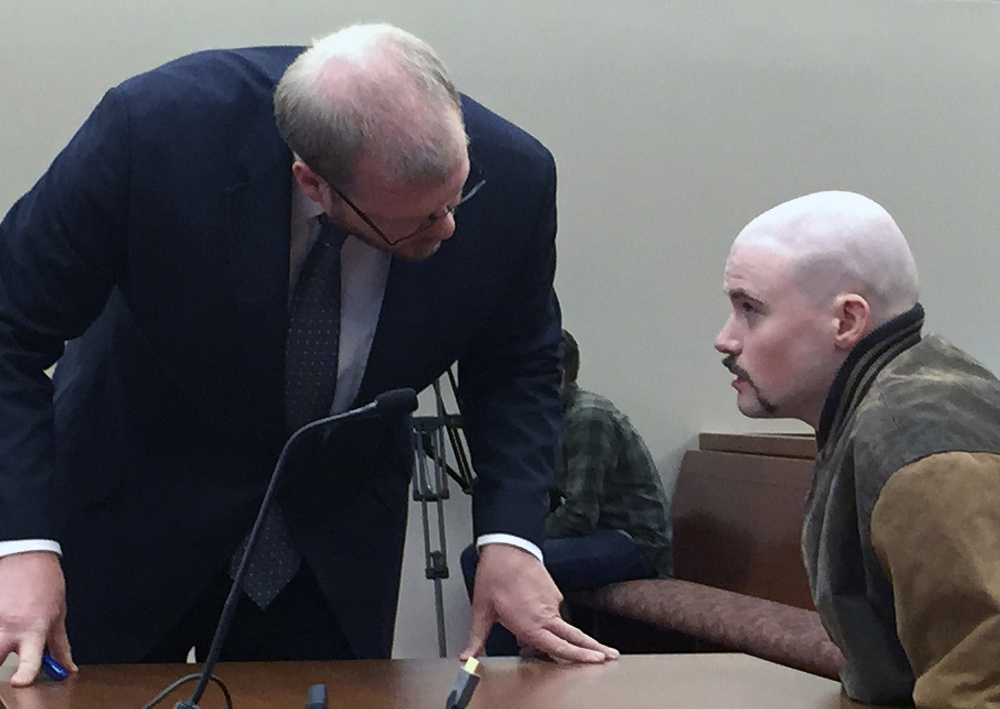AUGUSTA — A man accused of killing his father and dismembering his body will be given medication over his and his attorneys’ objections, a judge has ruled.
Justice Donald Marden this week ordered Leroy Smith III, 26, of Gardiner, to be medicated involuntarily in an effort to restore his competence to stand trial.
Smith, who has been diagnosed with a delusional disorder, has been found mentally incompetent to assist his attorneys in defending himself on the charge of intentional or knowing or depraved indifference murder, all in connection with the May 3, 2014, death of Leroy Smith Jr., 56, in the apartment they shared.
The ruling by Marden follows a hearing Dec. 2, 2015, at the Capital Judicial Center.
The state had sought the order because Smith had refused to take the medication while being held at the state’s forensic hospital, Riverview Psychiatric Center.
“We are in the process of reviewing the court’s order to determine the next steps that will be taken in this process,” Smith’s attorneys, Scott Hess and Pamela Ames, said in an email Friday. “This is a new law, so we are going to take a very close look at what options are available at this point in the proceeding.”
Smith’s was the first case to come before a judge in Maine following a state law that went into effect in July 2015 that allows a judge to order that a defendant be medicated involuntarily to restore competence.
In making the ruling, a judge has to consider whether “important state interests are at stake” and whether it is “substantially likely to render the defendant competent to proceed” and unlikely to produce side-effects that would interfere with the defendant assisting defense attorneys. Also, a judge must decide whether involuntary medication is necessary, whether “any alternative, less intrusive treatments” are unlikely to succeed, and whether the medication “is in the defendant’s best medical interest.”
Testimony at various hearings and in court documents indicates Smith had taken Seroquel briefly to address sleep problems and that Smith appeared to be less delusional and more rational while on that medication.
“Based upon medical, psychological, and psychiatric testimony, the Court is satisfied that the protocol suggested by the treatment team at the Riverview Forensic Unit is likely to render the Defendant competent to proceed and is unlikely to provide side effects that would significantly interfere with the Defendant’s ability to assist defense counsel in conducting the Defendant’s defense,” Marden wrote.
Marden ordered that antipsychotic medication “as deemed appropriate by Defendant’s treating psychiatric and medical team at Riverview” be administered orally unless Smith refused it, in which case in can be by injection.
Marden also ordered that the psychiatric practitioner provide a minimum of weekly progress notes to the court detailing the type of medication, dosage, method of administration and its effect on Smith.
A status conference in the case is to be held in April, or sooner if attorneys for either side seek it.
The prosecutor in the case, Assistant Attorney General Deborah Cashman, had argued in a court filing that “there is a significant state interest in restoring defendant’s competency in this case.”
Hess and Ames objected, saying it was not in Smith’s best interest, since he then would face trial on the murder charge.
In January 2015, Marden found that Smith was incompetent to face the charge.
At that point, Smith stood up in the courtroom and told the judge he wanted to fire his attorneys, saying they had failed to represent him properly. He also talked about an incident in 2011 somehow involving the heavy metal band Slayer.
He said that at some point in 2011, “I had a gun held against my head and was sworn to keep secret about what I am. They refused investigating any persons responsible. The whole entire group Slayer was there. I was told then that what they did was too overboard.”
Police say Smith stabbed his father to death in the apartment they shared, dismembered the body and distributed body parts in a rural area of Richmond. At a hearing five days later, the younger Smith claimed to be a political prisoner.
This story has been corrected. We previously stated Leroy Smith III’s age was 29. His correct age is 26.
Betty Adams — 621-5631
Twitter: @betadams
Send questions/comments to the editors.





Comments are no longer available on this story